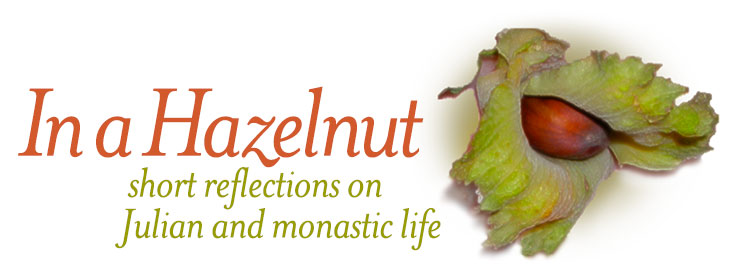Entering the desert
For this first Sunday in Lent, our readings begin, appropriately enough, at a beginning. Here is God after the Great Flood letting Noah, his family, and all the animals out of the ark, renewing his covenant with them, and shooing them back out into the wilderness of the newly dried world. The baptism of Jesus marks a similar new beginning in the healing of the world, and like Noah, he too is shooed out into the wilderness. And each of us has come, like a Noah, through the waters of baptism, each with our own interior zoo of wild and domesticated animals: a boat-ful of needs, desires, hopes, fears, strengths and weaknesses. And with the blessing of the Father, by the urging of the Spirit we have been turned out of the ark with Christ into this desert of the monastery to be tested, refined and proved.
As nuns, our identification is with this particular episode in the life of Jesus more than perhaps any other. Following the early monastics of Egypt and Syria, following Julian in the desert of suburban Norwich, our life here is deliberately circumscribed by the desert of this gospel. We may impose some kind of order upon it in the outward forms of Rule and mode of life, but the reality of the desert remains: like God, the desert is not tame, and it is no respecter of persons.
Why then, am I continually surprised by the desert I carry inside myself, and by what I meet there? Why am I surprised by temptations to pride and vanity, by my own neediness and possessiveness? Why does it so surprise me to find among the very good things about community life prickly and thorny things as well? It is true that we can so romanticize The Desert and Christ's forty days in it that we lose all sense of its present reality: this annoyance, this small privation, this inconvenience, this whispering temptation, this realization of weakness; this is precisely the desert into which we have been called to be tested, tempered, and formed. In this desert and no other is where we are challenged to become real human beings sustained and renewed not by our own design and contrivance but by the mercy of God.
It is promised to us in the prophets that the desert inside and outside of ourselves will not always remain so. By love, by cooperation with God and his creatures, in the strength of our indelible attachment to Christ in baptism, this desert will no longer be a severe teacher, but become a garden and place of blessing.
Recent Issues
May 2024
March 2024
February 2024
January 2024
December 2023
November 2023
October 2023
July 2023
May 2023
January 2023
December 2022
October 2022
September 2022
July 2022
May 2022
April 2022
March 2022
January 2022
December 2021
November 2021
October 2021
June 2021
May 2021
April 2021
February 2021
January 2021
December 2020
October 2020
September 2020
August 2020
July 2020
June 2020
May 2020
April 2020
March 2020
February 2020
January 2020
December 2019
November 2019
October 2019
September 2019
August 2019
July 2019
May 2019
April 2019
March 2019
January 2019
December 2018
November 2018
October 2018
September 2018
August 2018
July 2018
June 2018
May 2018
April 2018
March 2018
February 2018
January 2018
December 2017
November 2017
October 2017
September 2017
June 2017
May 2017
April 2017
March 2017
February 2017
January 2017
December 2016
November 2016
October 2016
September 2016
August 2016
July 2016
June 2016
May 2016
April 2016
March 2016
February 2016
January 2016
December 2015
November 2015
October 2015
September 2015
August 2015
July 2015
June 2015
May 2015

